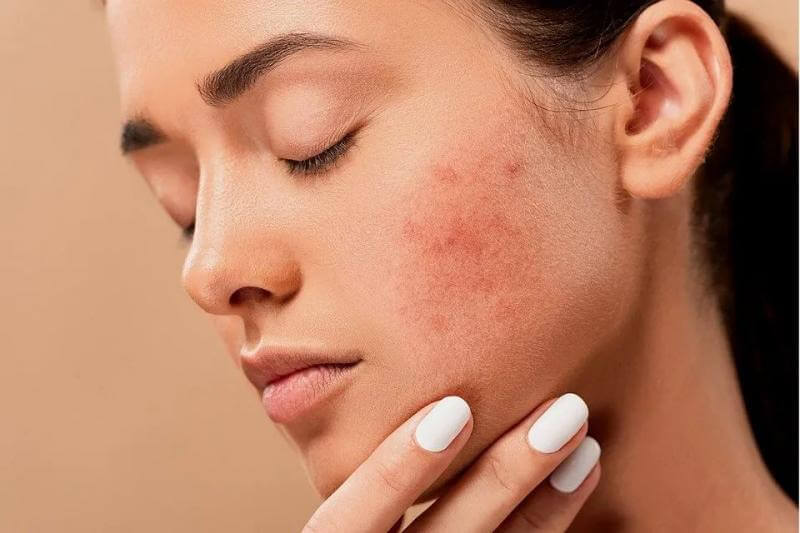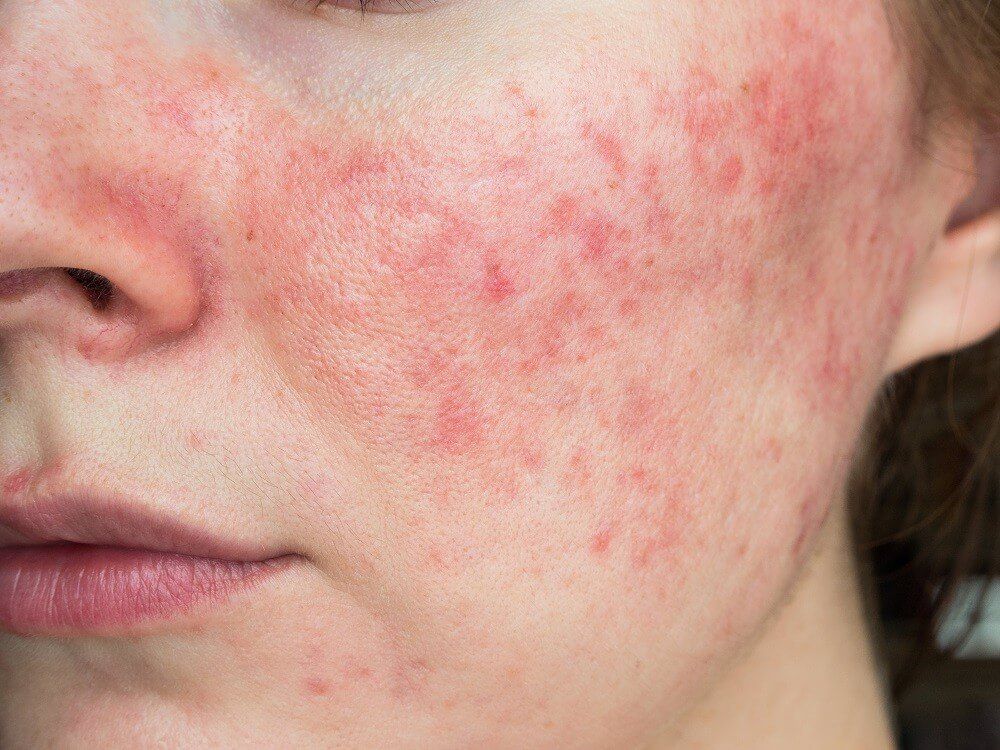
- Home
- Trend
- Weight Loss Strategies
- Acne Tips
- Hair Health Information
- Blemish Removal Tips
- Acne Scar Removal Tips
- Muscle Building Techniques
- Intimate Care Tips
- Postpartum Intimate Care
- Eye Bags Wiki
- Tips for Face Slimming
- Secret of Permanent Hair Removal
- Breast Enlargement Tips
- Cure to Snoring
- Marionette Lines
- Skin-Tightening Secrets
Skin sensitivity bumps often appear in individuals with sensitive skin. These bumps are red, swollen, and itchy, causing significant discomfort. Although skin sensitivity is not a severe skin issue, it can still affect daily life to some extent. In this article, we’ll explore skin sensitivity, providing more insights into the causes and symptoms of skin sensitivity bumps, how to detect sensitive skin, and more. If you suspect you have sensitive skin or often experience skin sensitivity bumps, don’t miss out on this information!
What Is Skin Sensitivity?

Skin sensitivity, as the name suggests, refers to skin that is easily irritated due to a weakened immune system. When skin immunity is insufficient, the skin lacks the ability to repair damaged cells promptly, preventing the proper secretion of sebum to form a protective barrier. This leads to various discomforts or symptoms such as redness, swelling, thickening of the skin, dryness, flakiness, itching, or pain. According to statistics, nearly 60% of women in urban areas have sensitive skin, which triggers skin sensitivity when exposed to external substances.
How to Detect Sensitive Skin

You can determine if you have sensitive skin by observing certain characteristics. Sensitive skin typically displays the following traits:
1. Frequent redness, swelling, flakiness, dryness, or itching
2. Rapid loss of moisture from the face
3. Sudden appearance of skin sensitivity bumps
If these symptoms have appeared 1-2 times or more, your skin is likely sensitive.
免費體驗
Acne Treatment
1 Minute Self-Registration
Date should not be before minimal date
Causes of Skin Sensitivity
Understanding the causes of skin sensitivity is crucial in combating skin sensitivity bumps. By grasping the basics of skin sensitivity, you can treat your skin appropriately based on its condition.
Cause 1: Aging
As we age, the chances of developing skin sensitivity increase significantly. Young women may not experience sensitivity even without additional skin care, but as they age, their metabolism and immune system weaken, leading to skin becoming more sensitive. This happens because the skin’s protective acid mantle, which helps maintain moisture balance and protect the skin from external stimuli, becomes thinner with age. As a result, the skin becomes more vulnerable to external irritants and triggers skin sensitivity.
Cause 2: Changes in Temperature and Humidity
Weather fluctuations are another major cause of skin sensitivity. Living in Hong Kong, you’re no stranger to unpredictable weather, ranging from hot to cold. The humid environment and frequent changes in temperature can make the skin unstable, leading to skin sensitivity bumps. In particular, Hong Kong winters are dry one moment and damp the next, creating an unstable environment for the skin. This causes an imbalance of oil and moisture, leading to redness, rashes, cracks, and the appearance of sensitivity bumps.
Cause 3: Clothing Materials
Clothing, which is in constant contact with the skin, can also affect its condition. If the fabric contains allergenic components, prolonged exposure can trigger skin sensitivity. Women who sweat more may experience more severe redness and itching. Doctors also note that those with sensitive skin, such as eczema sufferers, should avoid wearing clothes made of synthetic fibers, which can exacerbate sensitivity. It is recommended to wear cotton undergarments to reduce the risk of irritation from synthetic materials or wool.
Cause 4: Dietary Habits
While consuming fatty acids and proteins separately does not lead to skin sensitivity, when eaten together, they can create powerful allergens. Sensitive skin individuals should avoid consuming high-fat, spicy, and irritating foods. Instead, try incorporating fish and shellfish, as their fats can effectively suppress allergens. Additionally, cooked foods are less likely to trigger allergic reactions compared to raw foods, so it's essential to be mindful of this.
Cause 5: Physiological Factors
Stress, emotional fluctuations, and irregular routines can weaken the body’s immune system, making it more susceptible to external allergens and irritants, which can trigger skin sensitivity. The symptoms vary, but common signs include redness, swelling, thickening of the skin, dryness, itching, pain, or the appearance of sensitivity bumps. While skin sensitivity cannot be completely cured, it can be managed with medication.
Cause 6: Eye Sensitivity
Skin sensitivity is not limited to the face. The eyes can also become sensitive due to allergens in the environment, such as dust mites, animal dander, or fungi. Additionally, air pollution from vehicles and industrial emissions in Hong Kong exacerbates eye sensitivity.
Symptoms of eye sensitivity include itching, swelling, tearing, redness, drooping eyelids, and tight, dry skin around the eyes.
Understanding the Difference Between Skin Sensitivity and Eczema
Many people confuse skin sensitivity with eczema, but the two conditions differ in causes and pathology. While both conditions may present with similar early symptoms—redness, itching, and sensitivity bumps—they require different treatments. Skin sensitivity is a general term without a specific medical name, while eczema is a medical condition called "atopic dermatitis" or "hives."
Eczema can be caused by genetic factors, leading to a deficiency in the body’s ability to produce protective oils and repair the skin barrier. External allergens and irritants can then trigger eczema. On the other hand, skin sensitivity can be caused by a variety of factors but is not as severe as eczema.
4 Emergency Remedies for Skin Sensitivity
If you’re dealing with skin sensitivity, try these remedies. If symptoms persist, it’s best to consult a professional.
Remedy 1: Apply a Repairing Moisturizer
When skin sensitivity strikes, avoid touching the affected area, as this could further inflame the skin. If the itching becomes unbearable, apply a repairing moisturizer for temporary relief.
Remedy 2: Use a Calming Moisturizing Spray
Stop using skincare products containing alcohol and apply a moisturizing spray that has calming and soothing properties. Look for sprays with ingredients like chamomile or rose to help hydrate and relieve irritation.
Remedy 3: Use a Cold Compress
A cold compress can help calm the skin and close pores. It helps reduce the heat and itching caused by sensitive skin, improving the natural immunity of the skin.
Remedy 4: Moisturize with Cooling Toner
For quick relief, try using a toner with ingredients like calendula, chamomile, or aloe vera. Soak cotton pads with toner and place them on the skin for 5 minutes to soothe redness and restore balance.
免費體驗
Acne Treatment
1 Minute Self-Registration
Date should not be before minimal date
Nutrients That Help Improve Skin Sensitivity
To reduce the appearance of skin sensitivity bumps, stay away from allergens and minimize the intake of allergenic foods. However, if you can’t avoid exposure, consider taking antioxidants to clear the body of free radicals that cause skin sensitivity.
Vitamin C
Vitamin C can help suppress histamine and reduce the invasion of allergens. It is found in guava, lemons, tomatoes, kiwis, and green vegetables. However, avoid excessive intake to prevent kidney stone formation.
Probiotics
Probiotics help maintain gut health and balance the immune system, which can improve skin sensitivity. Yogurt and probiotic drinks are great sources, but be mindful of their sugar and calorie content.
Vitamin D
Vitamin D enhances immunity and helps prevent inflammation, including skin sensitivity. Sources of vitamin D include eggs, milk, and salmon. Since vitamin D is fat-soluble, consume it with fatty foods for maximum absorption.
Recommended Emergency Teas for Skin Sensitivity
At home, you can brew some simple teas to alleviate skin sensitivity. These teas are quick and convenient, especially for busy urban professionals.
Recommendation 1: Chrysanthemum and Honeysuckle Tea
Honeysuckle and chrysanthemum are an excellent combination for relieving skin sensitivity bumps. These herbs are known for their cooling and detoxifying properties.
Recommendation 2: Glehnia & Coix Seed Tea
Another tea that can help with sudden skin sensitivity is Glehnia & Coix Seed Tea. Glehnia (also known as Bei Sha Shen) helps boost qi (vital energy), while coix seeds (Job’s tears) are known for eliminating internal dampness. This tea is particularly suitable for those with lung and spleen deficiencies or qi deficiency-related skin sensitivity. It’s also very easy to make: simply combine 10g of Bei Sha Shen, raw rehmannia (Sheng Di Huang), white atractylodes (Bai Zhu), Gynostemma (Wu Zhao Long), raw astragalus (Sheng Huang Qi), raw coix seeds, tribulus (Bai Ji Li), and saposhnikovia root (Fang Feng). Boil everything together for about 20 minutes and it’s ready to drink.
Try Perfect Medical’s Acne Treatment to Improve Sensitive Bumps!
There are many ways to tackle sensitive skin bumps, like the wet compress method we discussed earlier. However, not all skin types respond well to such methods. If you’re looking for a quick and gentle solution for sensitive bumps, then this treatment might be perfect for you!
Perfect Medical’s Acne Treatment is a non-invasive and skin-friendly method specifically designed to improve sensitive acne-like bumps. It is suitable for all skin types, does not damage the skin, and helps effectively prevent the formation of blackheads and acne.
This treatment is non-invasive and drug-free. It uses a dual-action spiral vacuum drainage technology, which involves two components:
• One channel employs exclusive vacuum microdermabrasion technology, paired with a purifying infusion formula. This gently and painlessly removes dead skin cells and surface debris.
• The other channel infuses medical-grade serums deep into the skin, rapidly stimulating collagen regeneration. This results in deep anti-inflammatory, antibacterial, and hydrating effects, balancing sebum production, unclogging pores, dissolving whiteheads and blackheads, and improving small bumps and acne.
免費體驗
Acne Treatment
1 Minute Self-Registration
Date should not be before minimal date
FAQ

What is skin sensitivity?
As the name suggests, skin sensitivity refers to having sensitive skin. When the skin’s immune defense is inherently weak, it lacks the ability to repair damaged cells in time. This compromises the sebum barrier, reducing its capacity to protect the skin, leading to symptoms like redness, swelling, thickened keratin, dryness, peeling, itching, or pain. According to studies, nearly 60% of urban women have sensitive skin, and external irritants can easily trigger reactions.
What causes skin sensitivity?
As women age, their likelihood of experiencing skin sensitivity increases significantly. When younger, even without much skincare, the skin may remain stable. But with age, the body’s metabolism and immunity decline, leading to varying degrees of sensitivity. Why does this happen? It’s because young skin is protected by a naturally weakly acidic sebum film, which helps retain moisture and protects against external irritation. However, as we age, this film gradually becomes thinner and less effective, making it easier for irritants to penetrate and cause skin sensitivity.
Can you share emergency methods for skin sensitivity?
When sudden skin sensitivity hits and small bumps appear, do not touch the itchy area—this can worsen inflammation. Also, avoid scratching and breaking the skin with your nails, as this can lead to bacterial infection. If the itch becomes unbearable, apply a soothing and repairing moisturizer to temporarily relieve discomfort.
Is Perfect Medical’s Acne Treatment safe?
Yes, Perfect Medical’s Acne Treatment is a safe and effective solution for improving acne. It involves infusing medical serums deep into the skin while cleansing with vacuum microdermabrasion. This pain-free, non-invasive process removes deep-seated oil and debris, unblocks pores, and rebalances sebum. It’s non-irritating and activates collagen repair to prevent future clogs. If you follow up with good hygiene and skincare, the results will be even more long-lasting.
Does the Acne Treatment hurt?
No. The Acne Treatment uses non-invasive devices, making the whole process completely pain-free. The vacuum microdermabrasion technology gently removes dead skin and impurities without causing damage. It helps treat acne, prevents new breakouts, and clears pores without strong discomfort. So if you’re looking for an acne solution that’s effective and painless, this is a top choice.








